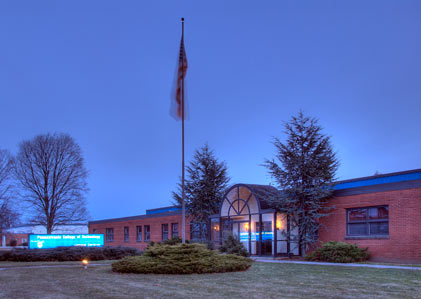Featured HVAC Degree & Certificate Programs
Mount San Antonio Community College
The HVAC programs offered here at Mount San Antonio Community College are accredited by both HVAC excellence and PAHRA. It offers an associate of science (AS) degree and a certificate in air conditioning & refrigeration technology. Combining classroom instruction with hands-on training, these programs will help students in understanding the basics of designing, troubleshooting, and maintaining HVAC systems.
The certificate program consists of 31.5 credit-hours and includes courses such as welding for air conditioning and refrigeration, refrigeration fundamentals, gas heating fundamentals, air properties & measurement, commercial systems, heat load calculations & design, and technical mathematics in air conditioning and refrigeration, among others.
The degree program is made up of 63.5 credit-hours including all courses from the certificate with additional general education coursework in public speaking, freshman composition, art course, humanities course, science course, and lifelong understanding course, among others.
Graduates of these programs can find employment opportunities in manufacturing, design, operation, distribution, sales, maintenance, installation, repairs, and controls.
- Location: Walnut, CA
- Accreditation: Partnership for Air-Conditioning, Heating, Refrigeration Accreditation (PAHRA); HVAC Excellence
- Expected Time to Completion: Certificate (12 months); AS degree (24 months)
- Estimated Tuition: $46 per unit
Grand Rapids Community College
Grand Rapids Community College offers HVAC training programs that have been accredited by PAHRA. The college offers the following two HVAC programs:
- HVAC/R certificate (38 credits)
- AAS degree in HVAC/R technology (60 credits)
The curriculum for the HVAC/R technology certificate includes courses such as refrigeration applications, basic refrigeration, heating theory, heating and cooling controls, air conditioning theory, HVAC/R electronic controls, HVAC blueprint reading and design, and more. All units earned in this HVAC/R certificate may be applied toward the AAS in the HVAC/R technology program.
The degree program includes courses in HVAC/R electronic controls, heating & cooling controls, commercial refrigeration, duct construction & design, metallic & non-metallic joining, mechanical codes, and basic boiler operation.
Students in these programs gain hands-on lab experience by installing equipment and performing service procedures. They learn about the principles of HVAC/R, heating, cooling, controlling, and filtering humidity, blueprint reading, diagnosing malfunctions, overhauling, repairing, and adjusting parts, units, and systems, and using technical reference manuals.
On successful completion of the program, graduates can take up roles such as heating and cooling technician, air-conditioning technician, domestic air-conditioning installer, environmental-control-system installer, climate control technician, refrigeration technician, and heating technician.
- Location: Grand Rapids, MI
- Accreditation: Higher Learning Commission; PAHRA
- Expected Time to Completion: Certificate (12 months); AAS degree (24 months)
- Estimated Tuition: Resident ($120 per contact-hour); non-resident ($253 per-contact-hour); out-of-state ($380 per-contact-hour)
College of Southern Nevada
This college also has HVAC programs that have accreditation from both HVAC Excellence and PAHRA. The College of Southern Nevada offers several HVAC programs that emphasize hands-on training and practical experience preparing students in analyzing and solving HVAC problems. There are a total of 9 programs offered by the college (4 certificates and 5 AAS degree programs).
The certificate programs include a 40.5-credit air conditioning technology certificate, a 41-credit air conditioning technology: central plant certificate, a 40-credit air conditioning technology: critical systems certificate, and a 42.5-credit air conditioning technology: foodservice refrigeration certificate.
The degree programs offered by the college include a 60-credit air conditioning technology program; an air conditioning technology: building automation program made up of 60 credits; an air conditioning technology: central plant program comprising 60 credits; an air conditioning technology: critical systems program consisting 60 credits; and a 61.5-credit air conditioning technology: foodservice refrigeration program.
As part of these programs, students will delve into topics such as residential gas heating, introduction to HVAC electrical theory and application, commercial refrigeration, heat pumps, copper fundamentals, boiler operation and maintenance, HVAC automatic controls, industrial electricity, troubleshooting, and equipment cooling, among others.
Graduates are prepared to obtain their EPA 608 certification as well as HVAC Excellence Employment Readiness certification. The college also offers an Entry-Level Air Conditioning Technician program which is made up of 18.5 credit hours.
- Location: Henderson, NV; Las Vegas, NV; North Las Vegas, NV
- Accreditation: Northwest Commission on Colleges and Universities (NWCCU); PAHRA; HVAC Excellence
- Expected Time to Completion: Certificates (12 months); AAS degrees (24 months)
- Estimated Tuition: Lower-division courses ($115.50 per credit); upper-division courses ($190 per credit)
Central New Mexico Community College
Central New Mexico Community College offers the following three HVAC programs:
- Certificate of completion in residential HVAC (26 credits)
- Certificate of completion in commercial, industrial HVAC & building performance (53 credits)
- Associate of applied science (AAS) degree in HVAC technology (65 credits)
This is yet another college that has all its HVAC programs accredited by HVAC Excellence and PAHRA. Students in these programs will gain knowledge in electrical circuitry and troubleshooting, proper refrigeration, mechanical equipment, hydronic piping practices, and maintenance and service of various types of HVAC/R systems and accessories.
The residential certificate comprises 26 credits including courses in basic electricity, refrigerant fundamentals, refrigerant management, air conditioning and controls, code and safety I, heating and heating control systems, composition I, and system design, installation & retrofit of heating/cooling systems.
The commercial certificate consists of 53 credits including all courses from the residential certificate with additional coursework in advanced hydronics & controls I, interpersonal communication, chilled water systems, hot water & steam generation systems & controls II, controls III, refrigeration application, code & safety requirements II, commercial and industrial refrigeration, energy efficiency & green building code compliance, and energy efficiency & green building standards I and II. The AAS degree is made up of 65 credit-hours including all courses from the certificates mentioned above. Students also have to complete additional coursework in humanities, mathematics, and social and behavioral science.
Students through these programs gain in-depth skills and knowledge about HVAC/R fundamentals through hands-on training in labs and develop a fundamental understanding of wiring diagrams. Graduates are well prepared to be employed by local service and installation contractors as well as facilities, local manufacturers, and hospitals.
- Location: Albuquerque, NM
- Accreditation: Higher Learning Commission; PAHRA; HVAC Excellence
- Expected Time to Completion: Residential certificate (two semesters); commercial certificate (four semesters); AAS (five semesters)
- Estimated Tuition: New Mexico Residents ($66 per credit); non-New Mexico residents ($334 per credit)
Wallace State Community College
The HVAC programs offered at Wallace State Community College help students gain the skills and knowledge needed for passing licensing and certification procedures, so they can start working in this high-demand HVAC field. The programs offered here include three short-term certificates in heating technician (12 credit-hours); refrigerant usage & handling specialist (12 credit-hours); and air conditioning technician (24 credit-hours), a 55-credit HVAC certificate, and an AAS degree in HVAC technology consisting of 64 credits.
The curriculum explores topics such as principles of refrigeration and electricity, HVAC/R electrical components, HVAC/R electrical motors, refrigerant piping practices, heat pump systems, commercial air conditioning, troubleshooting HVAC/R systems, gas heating systems, fundamentals of electric heat, service procedures, and commercial heating systems, among others.
At the end of the program, graduates can pursue several opportunities in the HVAC industry, and continue developing their knowledge and skills. Also, they may choose to receive a license to begin contracting HVAC/R services as a business owner or employee. Additionally, they may choose to further their education towards a higher degree at a four-year institution.
- Location: Hanceville, AL
- Accreditation: Southern Association of Colleges and Schools Commission on Colleges; HVAC Excellence
- Expected Time to Completion: AAS degree (four semesters); certificate (four semesters); short-term certificate (one to two semesters)
- Estimated Tuition: $123 per credit
Central Louisiana Community College
Central Louisiana Community College offers a technical diploma in HVAC/R providing hands-on training combined with classroom experience. This program prepares students for entry-level employment in a variety of jobs in the HVAC/R field. Students in this diploma will receive a certificate of competency after each semester they complete.
The diploma consists of 45 credits. Courses include an HVAC introduction, electrical fundamentals, principles of refrigeration, electric motors, electrical components, domestic refrigeration, residential heating, residential heat pumps, and residential system design, among others.
The program opens up several opportunities for graduates in the field of HVAC/R. They learn about the basics of installing, diagnosing, repairing, and maintaining the operating condition of residential, commercial, and domestic HVAC/R systems.
- Location: Natchitoches, LA; Alexandria, LA
- Accreditation: Accrediting Commission of the Council on Occupational Education (COE); HVAC Excellence
- Expected Time to Completion: 24 months
- Estimated Tuition: $127 per hour



